Marek rated Annihilation: 4 stars

Annihilation by Jeff VanderMeer (Southern Reach, #1)
Area X has been cut off from the rest of the world for decades. Nature has reclaimed the last vestiges …
A mix of academic (philosophy, cognitive science, some science and technology studies) and science fiction or fantasy. A bit of pop science for giggles.
Academic tastes: Enactive approach, embodied cognitive science, ecological psychology, phenomenology Fiction: Iain M. Banks, Ursula le Guin, William Gibson, Nnedi Okorafor, China Miéville, N.K. Jemisin, Ann Leckie
Love space opera but mostly disappointed by what I read there. Somehow didn't read Pratchett until recently, and now methodically working my through in sequence (I know sequence is not necessary, but ...).
This link opens in a pop-up window
52% complete! Marek has read 21 of 40 books.

Area X has been cut off from the rest of the world for decades. Nature has reclaimed the last vestiges …
This is a novel associated with the rpg Numenera from Monte Cook Games. The setting is a fantasy world where technologies of dead civilisations play the role of magic or weirdness.
The narrative is based around a character, Talia, who escaped a past of being a tortured instrument of violence for the sadistic (but rather vaguely specified) "vordcha". Having got away (not without sacrifice), she is trying to build a new life by taking on the role of "Poison Eater" in the city of Enthait. The Poison Eater puts their own life on the line to gain premonitions of dangers that the city's protectors can prepare to meet. But of course, all is not quite as it seems.
Honestly, this was a bit of a slog. There are some nice ideas here, and I really wanted to like it (I like the rpgs from Monte Cook Games). The …
This is a novel associated with the rpg Numenera from Monte Cook Games. The setting is a fantasy world where technologies of dead civilisations play the role of magic or weirdness.
The narrative is based around a character, Talia, who escaped a past of being a tortured instrument of violence for the sadistic (but rather vaguely specified) "vordcha". Having got away (not without sacrifice), she is trying to build a new life by taking on the role of "Poison Eater" in the city of Enthait. The Poison Eater puts their own life on the line to gain premonitions of dangers that the city's protectors can prepare to meet. But of course, all is not quite as it seems.
Honestly, this was a bit of a slog. There are some nice ideas here, and I really wanted to like it (I like the rpgs from Monte Cook Games). The writing is...fine. The characters are....fine. But it all feels a little bit too much like the protagonist is mired in self-pity rather than guilt. There's little to no impetus for the narrative itself (the villainous vordcha are supposedly hunting her but they're never described or made clear, so there's no clear sense of the threat).
The machinations within Enthait itself have the tone of intrigue without actually being very intriguing. It all just doesn't quite land for me. I really wanted to like this much more, but couldn't get there.
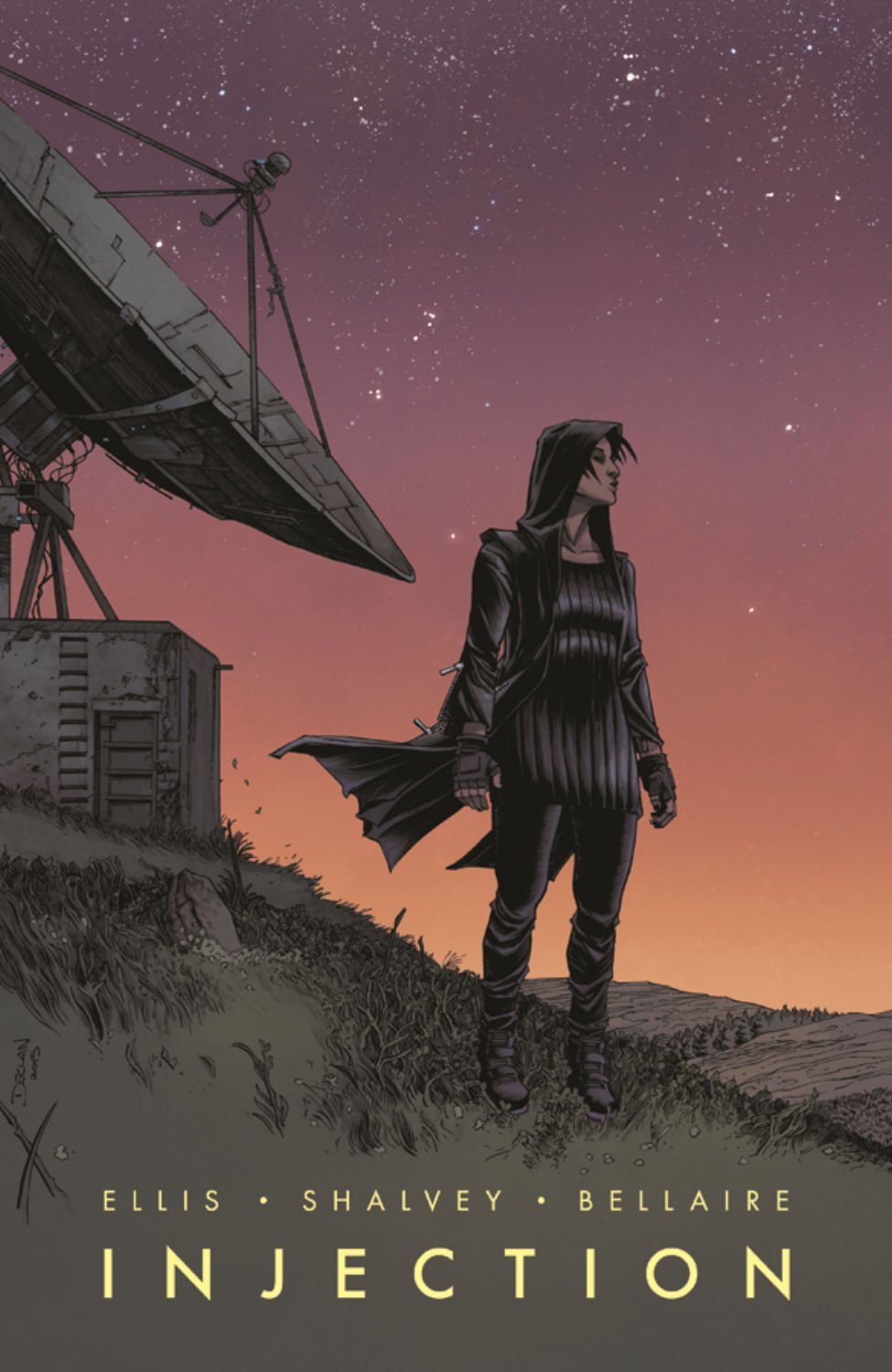
An archaeological dig in Cornwall has gone very wrong, very quickly. And Maria Kilbride has her hands full already, as …
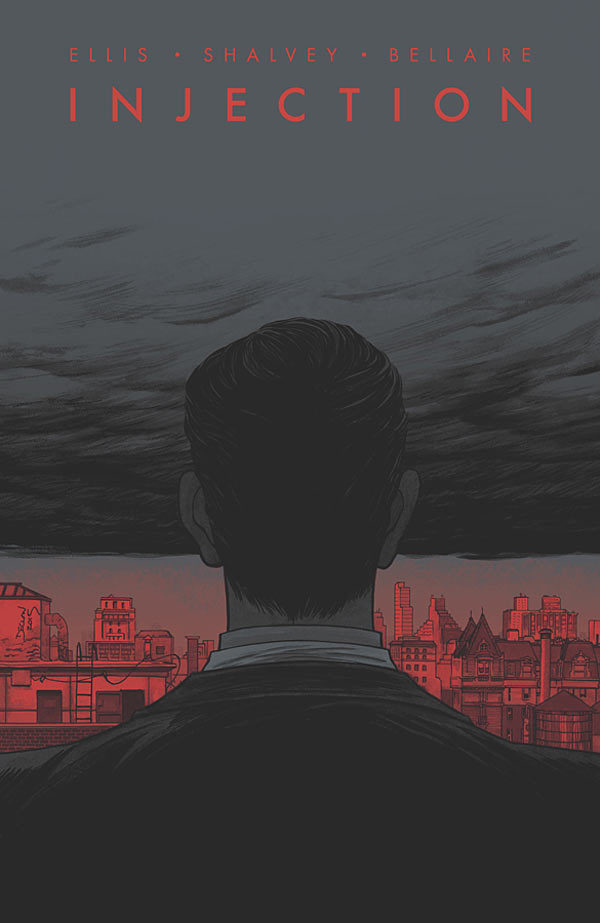
"Consulting detective Vivek Headland, originally of the group that caused the release of a haunted artificial intelligence into the world, …
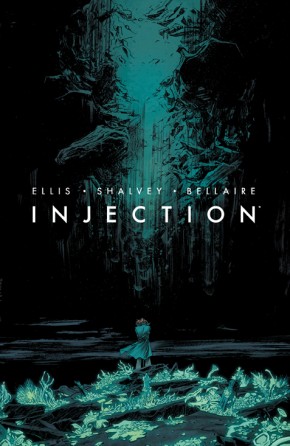
"Once upon a time, there were five crazy people and they poisoned the 21st century. Now they have to deal …
This is a solid, though perhaps not stellar follow up to Titanium Noir (2023). Cal Sounder, private detective, no longer with a foot in two worlds but uncertain of how he feels about being all-in on what might be the wrong side. A body on a beach whose complex history it will take until the final pages to understand.
Perhaps in keeping with noir-ish-ness, there is a lot left very vague. It isn't the very near future (some of the characters of hundreds of years old), but the technology level is very now+just a little. The only really breakaway technology is the rejuvenating chemical T7, which both resets your physical age to late-teens, while increasing your physical size by some significant portion. Multi-dose "Titans" become greater still. The location is vaguely both North American and European. The culture is one with a love-hate relationship to these uber-wealthy in the …
This is a solid, though perhaps not stellar follow up to Titanium Noir (2023). Cal Sounder, private detective, no longer with a foot in two worlds but uncertain of how he feels about being all-in on what might be the wrong side. A body on a beach whose complex history it will take until the final pages to understand.
Perhaps in keeping with noir-ish-ness, there is a lot left very vague. It isn't the very near future (some of the characters of hundreds of years old), but the technology level is very now+just a little. The only really breakaway technology is the rejuvenating chemical T7, which both resets your physical age to late-teens, while increasing your physical size by some significant portion. Multi-dose "Titans" become greater still. The location is vaguely both North American and European. The culture is one with a love-hate relationship to these uber-wealthy in the process of speciation.
It's steadily-paced, with good characterisation, though does have the noir tendency for just about everyone to be deeply cynical and drily witty about it the wretched state of the world.
The title refers to a strange phenomenon that rings true from the cyberpunk ancestry of the mixed-genre Harkaway is using here - people arriving like human flotsam to a beach in a quasi-catatonic state somewhere between existential dread and apathy. Suicidal without the intention, non-too-subtly wasting their days on a beach made of black glass, with no connection to the world around them.
The "sleepers" play a strange background role for the protagonist, a haunting of humanity rather than a narrative driver. I won't say too much more about them, though I did feel they were both some of the more interesting but also some of the more frustrating aspects of things as the story progresses.
There's mystery, some action, a little reflection on humanity and post-humanity. Certainly enjoyable, though not something I'll urging on people who aren't already curious.
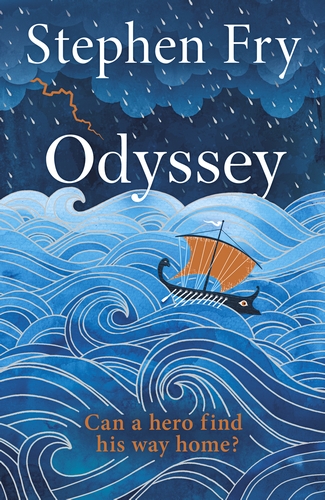
Follow Odysseus after he leaves the fallen city of Troy and takes ten long dramatic years - battling monsters, the …

Follow Odysseus after he leaves the fallen city of Troy and takes ten long dramatic years - battling monsters, the …
Because he draws as much from the Aeneid and other sources as from Homer, this takes a long time to properly get to the telling of the Odyssey itself. I could perhaps have done with less of the context, though given it's those aspects of the story I had little if any knowledge of, it's certainly those I've learned most from!
The books rounds out the telling of the ancient Greek myths, and gently, lovingly explores the transitions of humanity from awe and fear of the world to hard work and negotiation both with the world and with other people. The grand canvas of the myth woven of very personal, often selfish, individual stories. I guess like the titular hero, it takes its time, but it does get there in the end.
Because he draws as much from the Aeneid and other sources as from Homer, this takes a long time to properly get to the telling of the Odyssey itself. I could perhaps have done with less of the context, though given it's those aspects of the story I had little if any knowledge of, it's certainly those I've learned most from!
The books rounds out the telling of the ancient Greek myths, and gently, lovingly explores the transitions of humanity from awe and fear of the world to hard work and negotiation both with the world and with other people. The grand canvas of the myth woven of very personal, often selfish, individual stories. I guess like the titular hero, it takes its time, but it does get there in the end.
I'd have rated this much higher when I read it when I was young. It was for me, like many little nerds I think, one of the touchstone adventure stories. Very much so for people who were into or got into DnD (I wouldn't for several years after, but not for lack of wanting).
Mostly, it's a quinessential example of stereotypical high fantasy, sword and sorcery. It is a tightly woven string of major fantasy tropes; heroic adventure, fantastical settings and magical monsters. It holds up fine on the action and generally on characterisation.
It falls down mostly on attitudes to women, which are very mixed. On the one hand, the women generally have agency, clear character, and sometimes important roles to play in the plot and advancement of the setting. On the other hand, there is a recapitulation of traditional roles and attitudes that you're less likely …
I'd have rated this much higher when I read it when I was young. It was for me, like many little nerds I think, one of the touchstone adventure stories. Very much so for people who were into or got into DnD (I wouldn't for several years after, but not for lack of wanting).
Mostly, it's a quinessential example of stereotypical high fantasy, sword and sorcery. It is a tightly woven string of major fantasy tropes; heroic adventure, fantastical settings and magical monsters. It holds up fine on the action and generally on characterisation.
It falls down mostly on attitudes to women, which are very mixed. On the one hand, the women generally have agency, clear character, and sometimes important roles to play in the plot and advancement of the setting. On the other hand, there is a recapitulation of traditional roles and attitudes that you're less likely to see in modern fantasy literature. These issues are also true of race, which has thankfully seen huge strides in the genre since, even with further still to travel in many cases.
I re-read this because a friend casually sent a text a few weeks ago, wondering how it would hold up. Lacking motivation to get stuck into more challenging fare I pulled this 30--something-year-old copy of the shelf. I won't be rushing to continue the trilogy, but might get around it over time...

Dragons of Autumn Twilight is a 1984 fantasy novel by American writers Margaret Weis and Tracy Hickman, based on a …
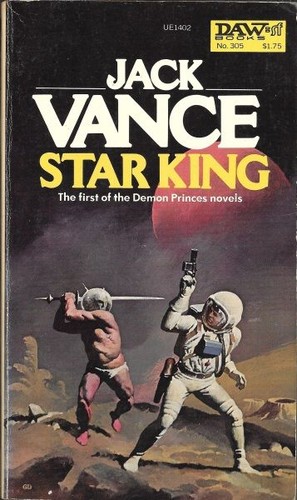
Kirth Gersen carries in his pocket a slip of paper with a list of five names written upon it. These …

It isn't much of an island that rises up one moonless night from the depths of the Circle Sea -- …